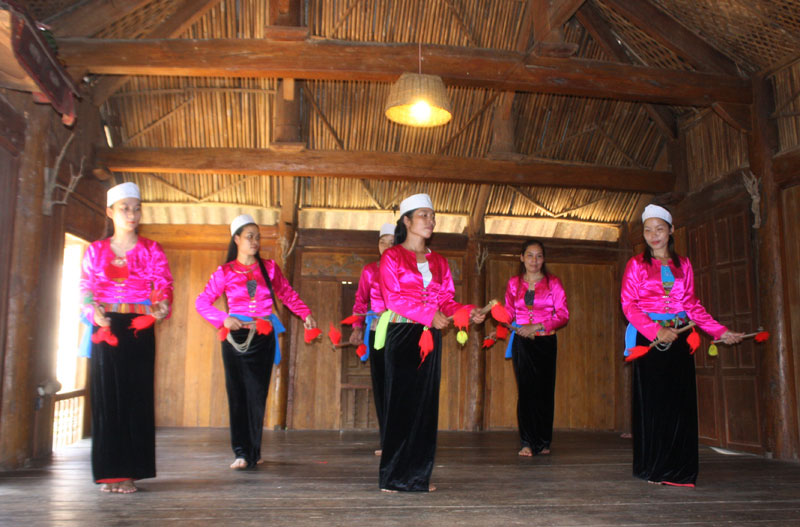
(HBO) - Lac Son is one of the four largest Muong ethnic minority districts in the province. The Muong ethnic population accounts for over 90% of the district population. Lac Son people are always aware of preserving and developing their ethnic cultural identity. Over the years, each stilt house has been preserved, Muong gongs and Muong Mo rhythm have been preserved. On holidays, from old to young women are dressed in traditional costumes.
The traditional festivals are restored and
preserved, such as the procession of The Buddha of Khu Dung Cave (Nhan Nghia
commune); Du Voi Festival (Lien Vu commune); Rock village roof festival (Yen
Phu commune), etc. Besides, the district also takes care of restoration of
revolutionary relics.

(photo: The art performance team of Mu
village, Tu Do commune practice regularly for holidays, Tet occasions).
Lac Son is one of the districts having the
most preserved stilt houses in the province. The District People's Committee mobilized
the people to preserve the traditional stilt houses and build a
concrete-floored stilt houses to protect the forest resources. At present, the
district has 18,640 houses on stilts, of which, wooden and bamboo stilt houses
accounts for 13,972 houses and stilts with concrete frame, wooden or bamboo
floors are 1,892 houses; total 2,776 houses of concrete stilt houses.
In addition, the district focuses on
preserving the unique values of Mo Muong rhythms. The District People's
Committee coordinates with the Department of Culture, Sports and Tourism to
study and propose scientific dossiers of the Khot series of Muong ethnic
artists. The district has 50 Mo Muong artists, of which 2 study Mo Muong, Mr.
Bui Van Minh (Van Son commune) and Mr. Bui Huy Vong (Huong Nhuong commune). The
District People's Committee develops mechanisms and policies to preserve the
values of Mo Muong heritage and promote the propaganda and publicity of Mo
Muong cultural heritage.
On the holidays, Tet occasions, the
harvesting seasons, the gong echo resounds in each village. The district holds
over 3,000 gongs in all kinds. The old people teach the young people, the later
generations learn from the previous generation, so the gong is echoed
throughout the mountains. In many communes such as Nhan Nghia, An Nghia, Tan
Lap, 100% villages have gongs teams. Specialists and amateurs are present
everywhere from the village festival to the big festival of the district, the
province. The artisans have contributed significantly to raising awareness
about the value of traditional cultural heritage in the community and creating
their own culture identity for Lac Son land and people. People of communes and
towns also preserve many traditional and unique cultural characteristics of the
ethnic minority in music through Vi singing, common singing, etc.
With an increasingly vibrant and widespread emulation movement aimed at building cultured residential areas and cultured families, Yen Thuy District has been making steady progress toward improving both the material and spiritual well-being of its people, while fostering a civilized, prosperous, beautiful, and progressive community.
Once lacking recreational spaces and community facilities, Residential Group 2 in Quynh Lam Ward (Hoa Binh City) has recently received attention for the construction of a new, spacious, and fully equipped cultural house. The project followed the model of state support combined with public contributions in both labor and funding.
The "All people unite to build cultural life" movement, which has been effectively integrated with Kim Boi district’s socio-economic development goals, is fostering a lively spirit of emulation across local residential areas, hamlets, villages, public agencies, and enterprises. In addition, through the initiative, traditional cultural values are being preserved and promoted, while community solidarity and mutual support in poverty reduction and economic development are being strengthened.
A working delegation of the Hoa Binh provincial People’s Committee led by its Permanent Vice Chairman Nguyen Van Toan on June 11 inspected the progress of a project to build the Mo Muong Cultural Heritage Conservation Space linked to tourism services in Hop Phong commune, Cao Phong district.
Born and growing in the heroic land of Muong Dong, Dinh Thi Kieu Dung, a resident in Bo town of Kim Boi district, in her childhood was nurtured by the sweet lullabies of her grandmother and mother. These melodies deeply imprinted on her soul, becoming an inseparable part of her love for her ethnic group's culture. For over 20 years, this love for her hometown has driven Dung to research, collect, and pass down the cultural values of the Muong people to future generations.
In the final days of May, the Ethnic Art Troupe of Hoa Binh Province organized performances to serve the people in remote, mountainous, and particularly disadvantaged areas within the province. These were not just ordinary artistic shows, but they were the meaningful journeys aimed at spreading cultural values, enhancing the spiritual life of the people and contributing to the preservation of ethnic minority cultural identities.



